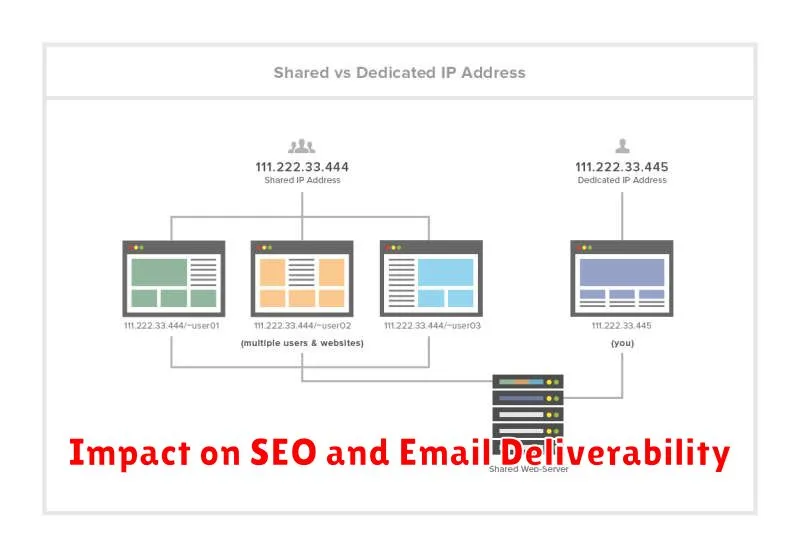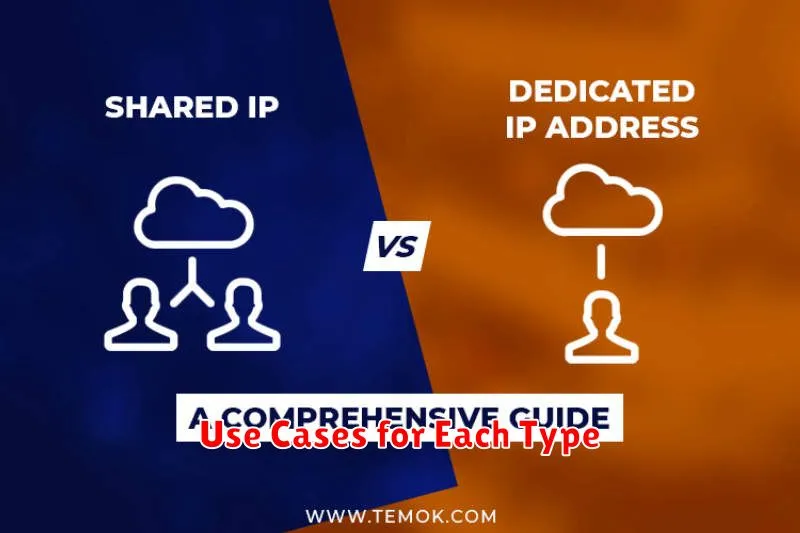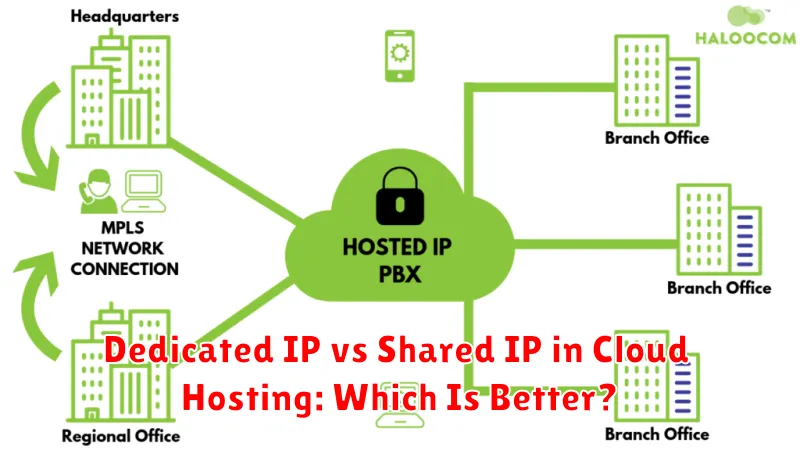Choosing between a dedicated IP address and a shared IP address is a crucial decision when selecting a cloud hosting plan. This choice can significantly impact your website’s performance, security, and email deliverability. Understanding the distinctions between dedicated IP vs shared IP in the context of cloud hosting is essential for making an informed decision that aligns with your specific needs. This article will delve into the advantages and disadvantages of each option, helping you determine whether a dedicated IP or shared IP address is the better choice for your cloud hosting environment.
We will explore the core differences between dedicated IPs and shared IPs, examining how they function within a cloud hosting infrastructure. We’ll analyze the impact of each on factors like SEO, blacklisting potential, and server control. By the end of this article, you will possess the knowledge to confidently select the optimal IP configuration for your cloud hosting needs, whether it’s a dedicated IP or a shared IP address, ensuring the best possible outcome for your online presence.
What Is an IP Address in Hosting?
In the context of web hosting, an IP (Internet Protocol) address is a unique numerical label assigned to every device connected to a network that uses the Internet Protocol for communication. This includes servers that host websites.
Think of it like a street address for a house. Just as the postal service uses a street address to deliver mail to the correct location, the internet uses IP addresses to send data to the correct server.
There are two main versions of IP addresses in use today: IPv4 and IPv6. IPv4 addresses are 32-bit numbers, often represented as four sets of numbers separated by periods (e.g., 192.168.1.1). IPv6 addresses are 128-bit, offering a vastly larger address space and represented in hexadecimal notation (e.g., 2001:0db8:85a3:0000:0000:8a2e:0370:7334).
When you access a website, your computer uses the website’s IP address to connect to the server where the website’s files are stored. The server then sends the requested files back to your computer, allowing you to view the website. While we typically access websites using domain names (e.g., example.com), these domain names are translated to IP addresses behind the scenes using the Domain Name System (DNS).
Differences Between Dedicated and Shared IPs
A dedicated IP address is exclusively assigned to a single user, meaning only their website or application uses it. This offers benefits like better security, email deliverability, and direct server access via FTP or SSH.
In contrast, a shared IP address is used by multiple users on the same server. This is a more cost-effective solution, but it carries the risk of one user’s actions potentially affecting others. If another user on the shared IP gets blacklisted, it could negatively impact email deliverability for all users sharing the IP.
| Feature | Dedicated IP | Shared IP |
|---|---|---|
| Cost | Higher | Lower |
| Security | Better | Lower |
| Email Deliverability | Better | Potential Issues |
| Server Access | Direct | Shared |
| Number of Users | Single | Multiple |
Impact on SEO and Email Deliverability

A dedicated IP address generally doesn’t directly impact SEO. Search engines prioritize website content, performance, and user experience over IP addresses. While a dedicated IP won’t magically boost rankings, it can offer more control, which can indirectly benefit SEO. For example, if your site experiences sudden traffic spikes, a dedicated IP prevents potential slowdowns due to shared resources. This maintains a positive user experience, which is a ranking factor.
Email deliverability, however, can be significantly impacted by IP reputation. With a shared IP, your email deliverability can be affected by the actions of other users on the same server. If they engage in spam practices, your emails might also be flagged as spam. A dedicated IP gives you full control over your sender reputation. This allows you to carefully cultivate a positive email sending history, improving your chances of reaching inboxes.
Ultimately, for most users, a dedicated IP is not essential for SEO. Its primary advantage lies in email deliverability for high-volume senders or businesses with strict compliance requirements. For smaller websites or those sending limited emails, a shared IP address usually suffices.
Security Considerations
Security is a critical factor when choosing between dedicated and shared IPs. With a dedicated IP, you have greater control over your server’s security posture. You are solely responsible for its maintenance and can implement specific security measures tailored to your needs. This isolation reduces the risk of being affected by the actions of other users on the same server.
Shared IPs, however, can pose some security challenges. If another user on the same IP address engages in malicious activities, it could potentially negatively impact your server’s reputation and even lead to blacklisting. This can affect email deliverability and search engine rankings.
While shared IPs might appear more vulnerable, reputable cloud providers implement robust security measures to mitigate these risks. These include firewalls, intrusion detection systems, and regular security audits. Additionally, careful server management and adherence to best practices can significantly enhance security regardless of the IP configuration.
Cost Differences Explained
A primary differentiator between dedicated and shared IPs is cost. Shared IPs are significantly less expensive. This is because the cost of the IP address is distributed among all users sharing it. Think of it like an apartment building – many residents share the same street address, reducing the cost per resident.
Dedicated IPs, on the other hand, come at a premium. You are solely responsible for the cost of the IP address, similar to owning a standalone house. This higher cost is justified by the benefits a dedicated IP offers, such as increased control and reputation management.
Choosing between a shared and dedicated IP often involves balancing budget considerations with the technical requirements of your application. If cost is a primary concern and your application doesn’t require the specific advantages of a dedicated IP, a shared IP is usually the more economical choice.
Use Cases for Each Type

Choosing between a dedicated IP and a shared IP depends largely on your specific needs and how you intend to use your cloud hosting.
Dedicated IPs are best suited for scenarios requiring enhanced security, improved email deliverability, and consistent SSL certificate implementation. This makes them ideal for e-commerce websites, online stores, businesses handling sensitive data, and applications demanding stable and reliable connectivity. If you anticipate needing direct access to your server via IP, or require a consistent IP for whitelisting purposes, a dedicated IP is the preferred choice.
Shared IPs, on the other hand, are a cost-effective solution suitable for small websites, blogs, testing environments, and applications where stringent security and email deliverability are not paramount. They are a practical option for users who are starting out and have limited budget constraints or for projects in early development stages.
How to Choose the Right One
Selecting between a dedicated IP and a shared IP for your cloud hosting depends on your specific needs and priorities. Consider the following factors to make an informed decision:
Security: If security is paramount, a dedicated IP offers enhanced protection against blacklisting and allows for easier implementation of SSL certificates for secure transactions. Shared IPs can be vulnerable to blacklisting due to the actions of other users sharing the same IP.
Email Deliverability: For businesses relying heavily on email communication, a dedicated IP can improve email deliverability rates. With a shared IP, if another user on the same IP engages in spamming, your emails might also be flagged as spam.
Performance: While not a significant factor in most cases, a dedicated IP can offer a slight performance advantage, especially under heavy traffic. With a shared IP, resources are divided among users.
Cost: Shared IPs are generally included in standard cloud hosting plans, while dedicated IPs often come at an additional cost. Factor this into your budget when making your decision.
Technical Expertise: Managing a dedicated IP requires a slightly higher level of technical expertise. If you’re not comfortable managing server configurations, a shared IP might be a simpler option.

